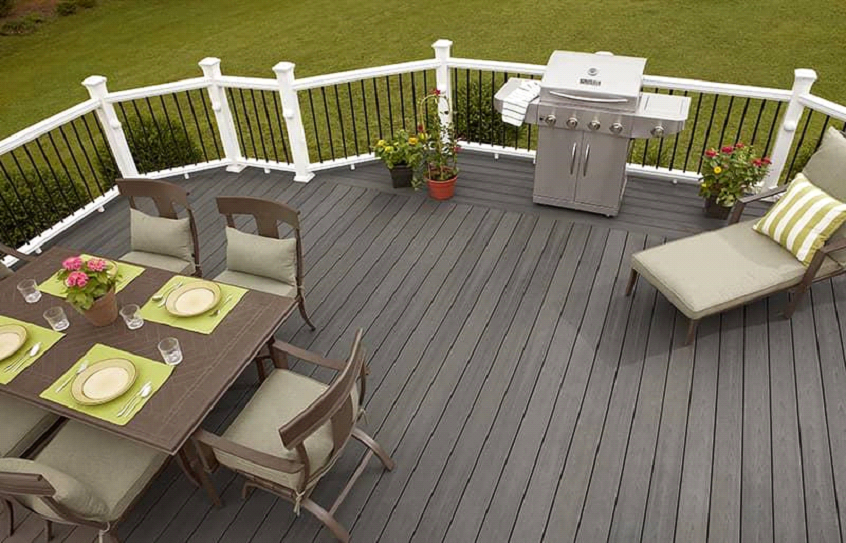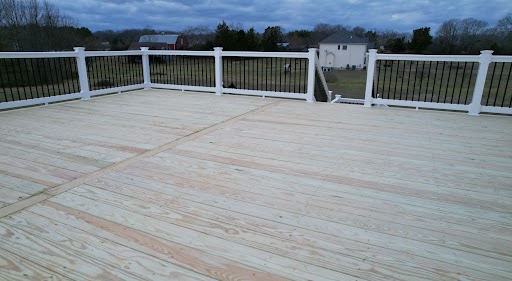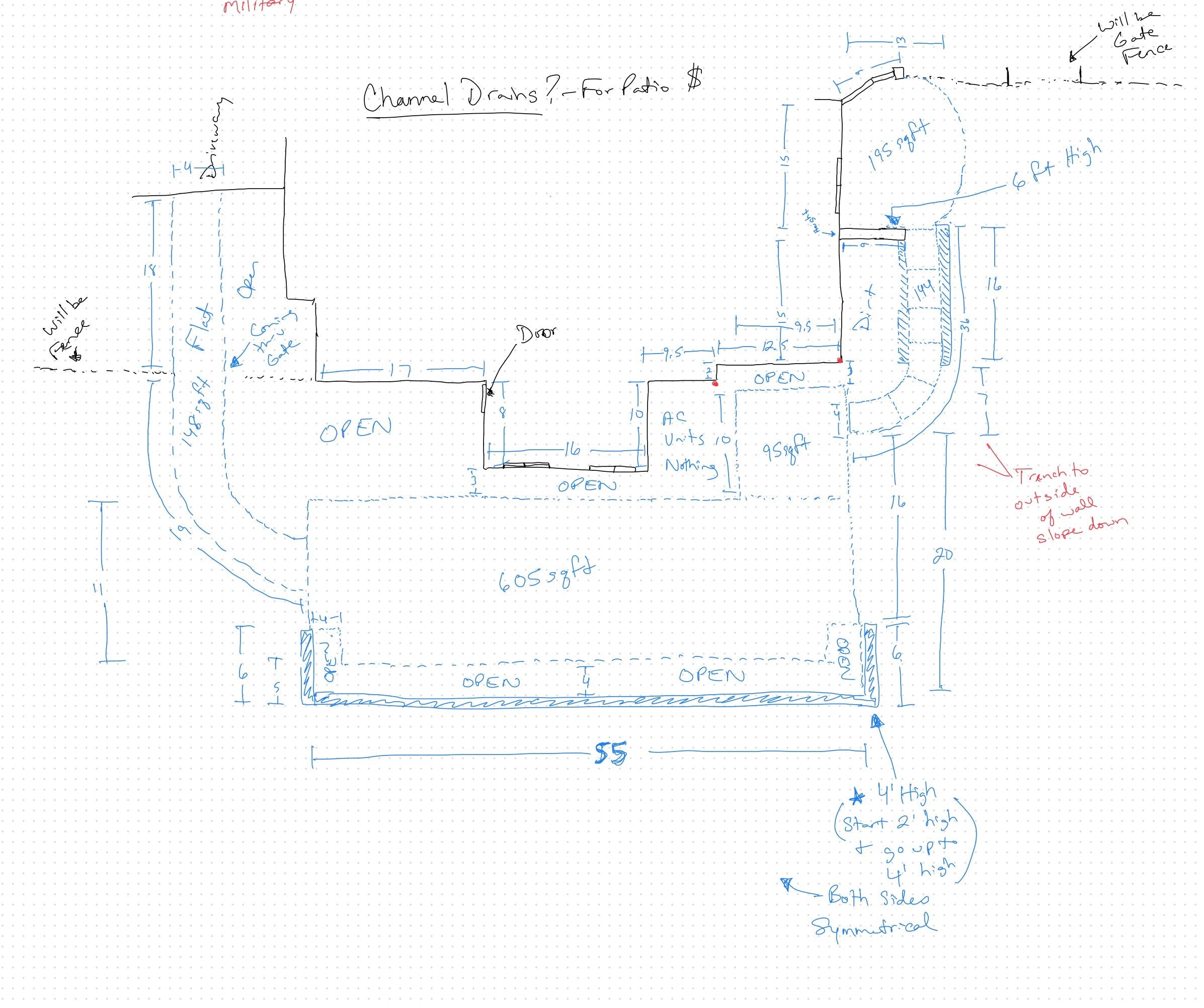Comparing Contractor Quotes: 6 Questions You Should Be Asking
May 5th, 2023 | 6 min. read
By Phil Parsons

Whether you’re building a new porch, patio, or deck, getting quotes from multiple contractors is an essential step in that process. And even though it’s a necessary step, more often than not it can be a confusing and overwhelming one. How do you know if you’re comparing apples to apples? What if you miss out on a key element in one of the quotes that could cause unexpected costs later on? Comparing contractor quotes is not just about comparing the bottom line price.
At KP Contracting, we’ve been crafting beautiful decks for well over a decade. We’ve chatted with countless clients and one of the top questions we hear is, “How do I compare quotes from different contractors?”
We get it, comparing quotes can be a daunting task. There are so many factors to weigh, and for your investment, it’s crucial to select a contractor that you have complete and utter confidence in.
That’s why in this article we want to share with you the 6 essential questions you should ask yourself when comparing quotes to help determine whether you’re comparing apples to apples or apples too– well, lemons!
Let’s dive in!
The 6 Essential Questions You Should Be Asking When Comparing Contractor Quotes
- Does the quote or contract specifically name the type of material that will be used?
- Does the quote include any warranties?
- Does the quote include the dimensions of the product to be built?
- Does the quote sufficiently outline the scope of work?
- Does the quote have any glaring red flags?
- How Can I Tell If The Contractor is Trustworthy?
Does Your Quote or Contract Specifically Name the Type Of Material That Will Be Used?

- Materials are not all created equally, especially when it comes to wood. That’s why at KP Contracting we only use wood that is specially treated and guaranteed for ground contact. This premium product is not only going to last longer than box store lumber but will also look better over time. While other contractors may opt for cheaper wood products, we aren’t willing to compromise on quality. Some manufacturers of high-quality decking also provide many lower-quality lines of their brand to box stores and discount lumber suppliers of decking.
- When considering a contractor for your project, it’s important to ask specific questions about the materials they plan to use. Your contractor should list the brand name and style of each and every piece of material they plan on using in your project so that you can know ahead of time exactly what you’ll be getting. This is so important because, for example, some railings that a contractor might propose to use may only come with a 5-year warranty, whereas there are other railings that can boasts a 30+ year warranty.
- This is exactly why asking your contractor to provide detailed information on the brand and style of each material they plan to use in your project is crucial. It allows you to know exactly what you’ll be getting and to ensure that you’re choosing quality materials that offer the best long-term value and satisfaction for your project.
- If you’re interested in composite decking, it’s so important to know the brand name and actual style the contractor is planning to use. Composite brands vary in price and quality based on their overall features such as durability, scratch resistance, heat resistance, and warranty.
Does The Quote Include Any Warranties?

A contractor’s willingness to guarantee their work is a good sign, but if they really stand by their promise, they’ll put it in writing. Don’t settle for just their word – make sure they put their promise in black and white.
At KP Contracting, we stand behind the quality of our work. We offer a lifetime workmanship guarantee and will promptly fix any defect that can be traced back to our workmanship.
Does The Quote Include The Dimensions Of The Product To Be Built?

It’s important to make sure that your contract includes the specific dimensions of the project you have agreed to in the quote and final contract.
Having this information in writing is not only vital to ensure that your expectations are met but also to protect you legally.
Another big reason why it’s so important to make sure that the project dimensions are included in the quote is that, if they’re not then there is no guarantee that you’ll receive what you envisioned.
So, to avoid any confusion or disappointments down the road, make sure the dimensions are correctly reflected in the written contract and that you are happy with what’s there.
Does The Quote Sufficiently Outline The Scope of Work?

When it comes to contracts, the devil is in the details. When we’re working on projects with our clients, we know that having a clear scope of work in writing is essential.
It may not be clear to you what absolutely needs to be spelled out, but if it’s something you’re paying for, it’s worth putting it in writing. For example, did the contractor say you would be getting a concrete or paver landing at the base of your deck stairs? Are your beams and posts being wrapped in PVC? Are you getting lighting for your deck stairs or post caps?
These are all important details that should be spelled out in your contract.
Remember, any verbal agreements must be put in writing. If it’s not in writing, you can’t be sure what is or isn’t actually included in your contract price and may have no legal recourse if something you were promised is omitted.
In most cases, the biggest differences between contractor quotes relate to the scope of work.
Recently, we had a customer who received a quote that was significantly lower than ours. When we asked them further questions, we discovered that the contractor with the lower quote was unwilling to specify the materials they would be using, they were not pulling the permit themselves but asking the customer to do it, and they were unwilling to share any former customer references. These are major red flags. It’s important to ask the hard questions of every contractor to make sure you’re getting the quality work you deserve.
Don’t be afraid to speak up and ask questions – your home and wallet will thank you!
Does The Quote Have Any Glaring Red Flags?

When hiring a contractor, it’s important to keep an eye out for any red flags that may arise. Here are just a few to look out for:
- Materials that are not listed in the contract or quote
- The contractor not pulling the required permits
- The contractor refusing to provide their MHIC license
- The contractor is not carrying adequate insurance
- The contractor refused to provide references (don’t forget to check publicly available reviews and the BBB for unresolved customer disputes!)
- A price that seems too good to be true – sometimes contractors will give a low price just to win the project, but then find reasons to raise it later.
- The contractor not putting in writing what factors could change the quoted price. At KP Contracting, our standard contract lists three conditions that, if met, could cause an increase in the quoted price. Those conditions are: (a) the customer changes the scope of work for the project themselves (e.g., increases the size of the deck); (b) while digging holes for footers it is discovered there is not suitable soil and engineering involvement and approval becomes required in order to resolve; or (c) while replacing a deck, rot or other damage is discovered that needs to be repaired to continue and it was found in a place that was not visible prior to demolition. We put this in writing so a customer is aware upfront of this potential, though unlikely, causes of a price increase.
How Can I Tell If The Contractor is Trustworthy?
When it comes to hiring a contractor, there are certain things you should look out for to ensure they are trustworthy and reliable. Here is a helpful checklist you can use when assessing the trustworthiness of any proposed contractor.
- First and foremost, take a look at their reputation. Research their track record and see if their previous customers have been happy with their service. You want to make sure they can deliver what they promise.
- Next, don’t just focus on the price. It’s important to compare their fee to the full scope of work they are proposing and weigh that against their credentials, references, and reviews. You want to be sure their past performance supports their ability to deliver what they promise at the price they’re charging.
- Communication is also key. Is the contractor clear and transparent with you? Are they available to answer any questions you may have? How timely are they in their responses?
- Check to see if the contractor is licensed and insured. This is important for your protection and peace of mind.
- Experience is another important factor to consider. Does the contractor have experience with similar projects? Do they have reviews or portfolios to show their previous work? It’s even better if they’re willing to provide references when asked.
We hope these guidelines and checklists make it easier for you to compare all of your quotes and ultimately choose the right contractor for you and your project.
At the end of the day, always remember to listen to your gut. If something seems off, it probably is. Check out our article on “Hiring a Deck Builder: Look Out For These 6 Red Flags“
Ready to hire a deck builder? Got more questions about how to choose the best deck builder for your specific needs? Let’s connect! We’d love to answer all your questions and guide you through your deck-building journey.
Phil Parsons is an owner at KP Contracting with 20-years’ experience in custom remodeling and the development of outdoor living spaces that bring friends and family together. He is a degreed engineer, and his work has been featured on HGTV.
